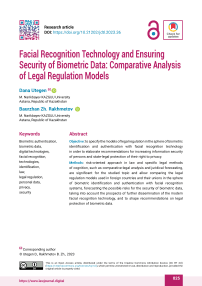Facial Recognition Technology and Ensuring Security of Biometric Data: Comparative Analysis of Legal Regulation Models
Автор: Utegen D., Rakhmetov B. Zh.
Журнал: Journal of Digital Technologies and Law @lawjournal-digital
Рубрика: Государство и право. Юридические науки
Статья в выпуске: 1 (3), 2023 года.
Бесплатный доступ
Objective: to specify the models of legal regulation in the sphere of biometric identification and authentication with facial recognition technology in order to elaborate recommendations for increasing information security of persons and state-legal protection of their right to privacy. Methods: risk-oriented approach in law and specific legal methods of cognition, such as comparative-legal analysis and juridical forecasting, are significant for the studied topic and allow comparing the legal regulation models used in foreign countries and their unions in the sphere of biometric identification and authentication with facial recognition systems, forecasting the possible risks for the security of biometric data, taking into account the prospects of further dissemination of the modern facial recognition technology, and to shape recommendations on legal protection of biometric data. Results: the ways are proposed to further improve legislation of the Republic of Kazakhstan and other countries currently developing the legal regulation of biometric data, regarding the admissible criteria for using the facial recognition technology, the elaboration of categorization of biometric systems with a high and low risk levels (by the example of the experience of artificial intelligence regulation in the European Union), and the necessity to introduce a system of prohibitions of mass and unselective surveillance of humans with video surveillance systems, etc. Scientific novelty: consists in identifying a positive advanced foreign experience of developing legal regulation in the sphere of facial recognition based on biometry (European Union, the United States of America, the United Kingdom of Great Britain and Northern Ireland), which can be used for further improvement of the national legislation in order to create more effective mechanisms of legal protection of personal data, including biometric information. Practical significance: based on risk-oriented approach and comparative analysis, the research allows elaborating measures for enhancing the legal protection of biometric data and ensuring effective protection of civil rights and freedoms by forecasting further expansion of the modern facial recognition technology.
Biometric authentication, biometric data, digital technologies, facial recognition, technologies, identification, law, legal regulation, personal data, privacy, security
Короткий адрес: https://sciup.org/14127557
IDR: 14127557 | DOI: 10.21202/jdtl.2023.36


